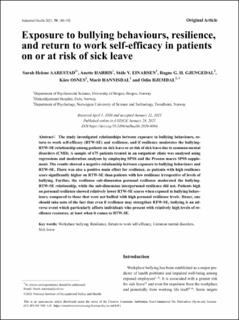Exposure to bullying behaviours, resilience, and return to work self-efficacy in patients with common mental disorders.
Aarestad, Sarah Helene; Harris, Anette Kristoffersen; Einarsen, Ståle Valvatne; Gjengedal, Ragne Gunnarsdatter Hole; Osnes, Kåre; Hannisdal, Marit; Hjemdal, Odin
Peer reviewed, Journal article
Published version

Åpne
Permanent lenke
https://hdl.handle.net/11250/2789235Utgivelsesdato
2021Metadata
Vis full innførselSamlinger
- Institutt for psykologi [3143]
- Publikasjoner fra CRIStin - NTNU [38525]
Sammendrag
The study investigated relationships between exposure to bullying behaviours, return to work self-efficacy (RTW-SE) and resilience, and if resilience moderates the bullying-RTW-SE relationship among patients on sick leave or at risk of sick leave due to common mental disorders (CMD). A sample of 675 patients treated in an outpatient clinic was analysed using regressions and moderation analyses by employing SPSS and the Process macro SPSS supplement. The results showed a negative relationship between exposure to bullying behaviours and RTW-SE. There was also a positive main effect for resilience, as patients with high resilience score significantly higher on RTW-SE than patients with low resilience irrespective of levels of bullying. Further, the resilience sub-dimension personal resilience moderated the bullying-RTW-SE relationship, while the sub-dimension interpersonal resilience did not. Patients high on personal resilience showed relatively lower RTW-SE scores when exposed to bullying behaviours, compared to those that were not bullied with high personal resilience levels. Hence, one should take note of the fact that even if resilience may strengthen RTW-SE, bullying is an adverse event which particularly affects individuals who present with relatively high levels of resilience resources, at least when it comes to RTW-SE.
